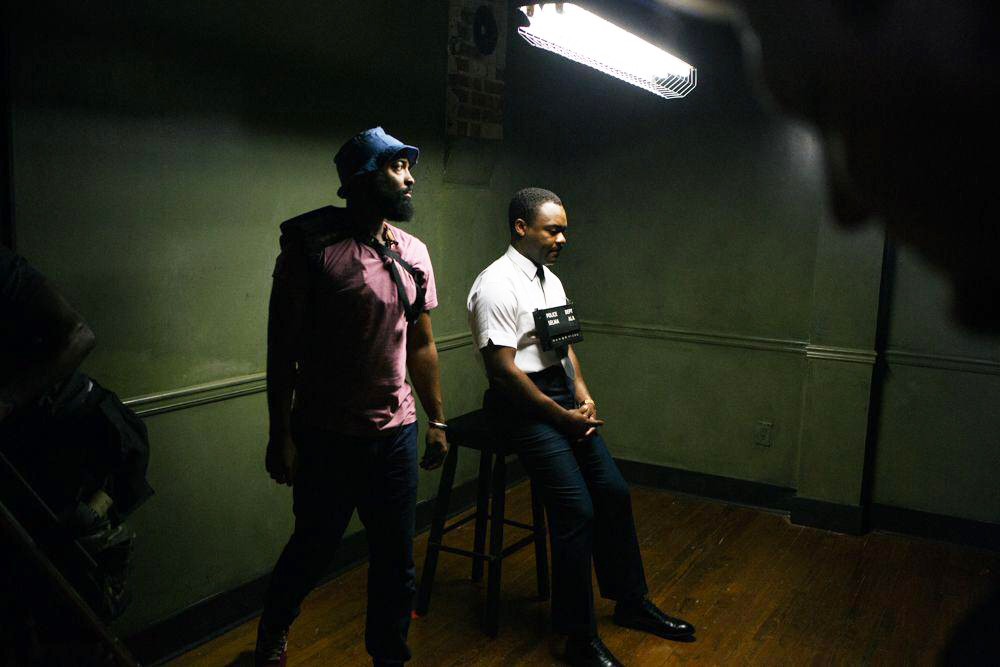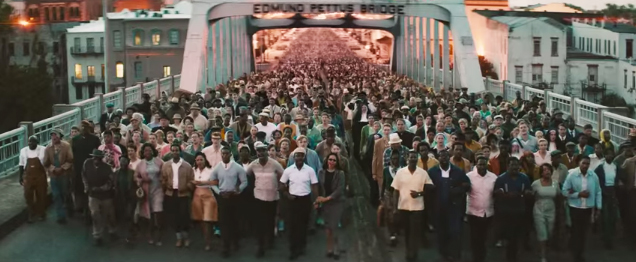Review: Selma
 Saturday, December 27, 2014 at 7:00PM
Saturday, December 27, 2014 at 7:00PM  Michael C. here with your weekend review
Michael C. here with your weekend review
Among the many achievements of Ava DuVernay’s tremendous Selma, the biggest may be that it rescues Martin Luther King from canonization as a two dimensional political saint. In the thirty years since Reagan declared a national holiday in his honor, the rough edges have been sanded off King’s legacy, its complexities all but deleted from the public consciousness. The remaining image is a positive but reductive one. To focus solely on King the martyr, standing at the podium, speaking about his dream of a world without prejudice is to gloss over all the messy grunt work that actually went into altering the course of history.
Now we have Selma, which not only restores King’s humanity, but his agency as a shrewd political strategist. The result is a film that doesn’t just bring the 1965 Selma marches blazing out of the history books but reflects current society back at us with riveting urgency.
I can already feel myself fighting a reluctance to go on extolling Selma’s importance for fear it might appear I am awarding the film bonus points for good intentions and right thinking. So let’s be clear: Selma is above all a triumph of filmmaking, proving that tackling Oscar-friendly material need not lead to a finished film that exudes a tepid, play-it-safe attitude. I can’t recall a moment where I found DuVernay’s film falling short, its grasp equal to its considerable reach at every turn.
Like many of the best biographical films, Selma avoids a birth-to-death retelling of King’s life, letting a narrow portion stand in for the whole. DuVernay’s film picks after King has delivered his “I have a dream” speech”, portraying the months when he organized a series of marches from Selma to Montgomery to protest the infringement on voting rights for southern blacks. With the recent passage of the Civil Rights Act ending legal segregation, President Johnson expects a grateful King to refrain from stirring up trouble, but he is dismayed to find King will not be deterred or even delayed. Instead, Dr. King plans to exert pressure on LBJ by goading the worst of the racist southern bullies into attacking peaceful protesters in front of TV cameras so the ensuing horrors can be beamed directly into the homes of sympathetic northern white audiences.
Selma’s portrayal of the appalling violence endured by protesters is heart stopping in its immediacy. I don’t think I will ever forget the image of a policeman on horseback emerging from a tear gas haze brandishing a whip at fleeing protesters. But where a lesser film would see such material as an end on to itself, Selma uses it as the jumping off point to a wider, more complex picture. The film recalls Lincoln in its depiction of the behind the scenes wheeling and dealing that makes historic change possible, but DuVernay's is the sharper, more disciplined affair, lacking Spielberg’s weakness for schmaltzy emotional crescendos. The script by Paul Webb, reworked by DuVernay, doesn’t shy away from making pointed political critiques either. Scenes contrasting King’s organization against a less effective local civil rights group make an unambiguous statement about the need for protests to be media savvy in pursuit of tangible political goals.
Special salute also to Bradford Young’s striking cinematography, which keeps things intimate and visceral, a million miles away from the stilted honey-drenched lighting other “important” films lay on a with a trowel.
 Bradford Young and David Oyelowo on set
Bradford Young and David Oyelowo on set
David Oyelowo’s mighty performance as King dominates the film, as it must, but one of the pleasant surprises of Selma is how generous it is with its expansive cast. Stephen Root, Tessa Thompson, Oprah Winfrey, Wendell Pierce, Giovanni Ribisi, Martin Sheen – this is only a partial list of the actors afforded moments to shine. And in her limited screen time as Coretta Scott King, Carmen Ejogo conveys the range of their relationship as both a marriage and a political partnership.
And then there are Tom Wilkinson and Tim Roth, a pair of old English pros delivering the character actor goods as two very different southern politicians, President Johnson and Alabama Governor George Wallace, respectively. Roth wisely underplays a figure plenty loathsome without any additional hamming and Wilkinson does justice to the sharp writing by mapping out a marvelously nuanced LBJ. The climactic confrontation between LBJ and Wallace is a corker, packed with the tension of unspoken motives and opinions - right up until some of them get said aloud, that is.
David Oyelowo, is a wonder as King but not quite in the way one expects from a great man biopic performance. One is never tempted to drag out the hoary old, “I felt like I was watching the real person!” cliché. He’s close enough to King to be entirely believable, but his performance is not a feat of mimicry. His best moments are not in duplicating the history book highlights, but in showing how that commanding presence transferred to the quieter behind-the-scenes moments - a fraught confrontation with his wife, a sad audience with the father of a slain protester, a tense altercation over the phone with the president. When the actor is given free rein to let loose with a full blast of King’s oratory it is all the more spellbinding for carrying with it the accumulated power of these smaller moments.
It is shocking to reflect that it took until 2014 for such landmark events to be brought to the big screen. It would have been easy in this case for DuVernay to skim the surface and end up with a satisfying film just by depicting the material at all. By choosing to steer the movie into such ambitious territory DuVernay has proven herself a force to be reckoned with. As a portrait of political unrest in action, Selma could not be more relevant. As the arrival of a directorial heavyweight it is essential viewing. Combine all this with a take on a vital segment of modern American history surprisingly under-explored on film thus far and Selma qualifies as a cinematic event.

Grade: A
Oscar Prospects: Across the board
Related Posts | Previous Reviews
 Ava DuVernay,
Ava DuVernay,  David Oyelowo,
David Oyelowo,  Reviews,
Reviews,  Selma
Selma 


Reader Comments (11)
Ah I can't wait to see this. Great review that makes me want to watch it even more. I'm not sure what I'm excited for the most, but the Oscar-watcher in me says I'm most curious to see how well it will do in the next two months following so much racial injustice in this country. Will "Selma" overtake "Boyhood" and "Birdman" as the movies to beat in 2014? If anything is going to, "Selma" looks to be the one.
Your question as to why it took so long to make this movie is a good one. It's been 50 years, but the timing does feel right, doesn't it?
I'm also very excited to see this. Great piece. Thanks.
Sean - I think you are correct. If anything is a threat to Boyhood it is this. I also could see Oyelowo breaking through the crowded Best Actor lineup
Michael C. - I'm assuming David Oyelowo will get a nomination, but what do you think the chances are of his actually winning over Michael Keaton and Eddie Redmayne?
As an aside, I'm really hoping Jake Gyllenhaal gets recognized for Nightcrawler. That's such a great movie with an excellent performance.
Sean - slim but not impossible. Oyelowo's work is a bullseye to Oscar's taste, much like Sean Penn's win for Milk.
This film has emotional power and relevance that the other two front runners lack. I see it eventually taking over the Oscar race the way The King's Speech took away the Oscar from The Social Network during the guilds.
I cannot wait to see this. Such a poignant film, especially in this time where the devastating nature of this country is really coming to the light again and act II of the black civil rights movement seems to be starting.
Wonderful review. Can't wait to see it. And I still believe Selma will win the Oscar for Best Picture - despite the lack of critics awards. Only problem will be the whether the rightwing conservative media stages a negative campaign against it. Remember what happened to Brokeback Mountain. The homophobic rightwingers destroyed any chance of it winning Best Picture. Arguably the best Pic nominee never to win the major prize.
I love Michael C.'s reviews, so it's taking all my restraint not to read this before I see Selma, which doesn't open here until 1/9.
I was super impressed by the film-- not only because it was so moving, but because it showed how King and other Civil Rights Movement leaders truly understood the power of the press and of the emerging medium of television. Its writing was just so sharp all around.
Bette - I know I'm a bit late, but I'll start the argument (even if no one ever sees this). Here are 10 losing Best Picture nominees that are way better than Brokeback Mountain. By the way, I am still a fan of Brokeback, it's just nowhere near the top of this list.
The Wizard of Oz (1939)
Citizen Kane (1941)
High Noon (1952)
To Kill a Mockingbird (1962)
Butch Cassidy and the Sundance Kid (1969)
American Graffiti (1973)
Star Wars (1977)
Apocalypse Now (1979)
Raiders of the Lost Ark (1981)
The Shawshank Redemption (1994)